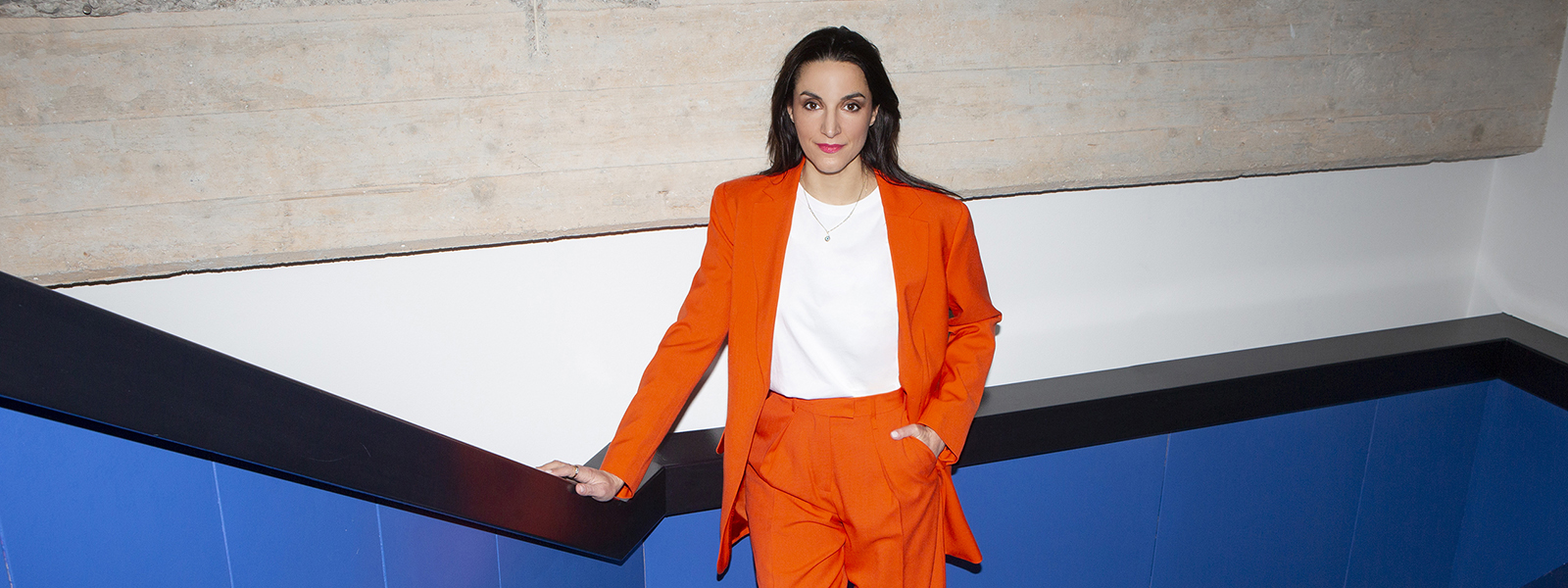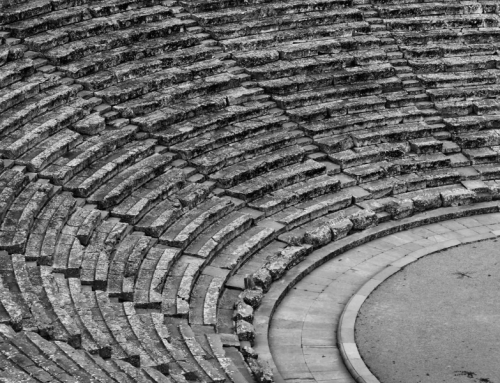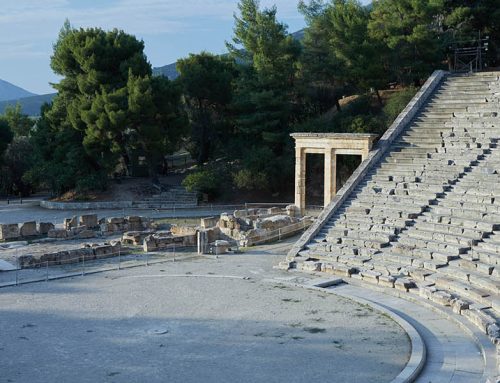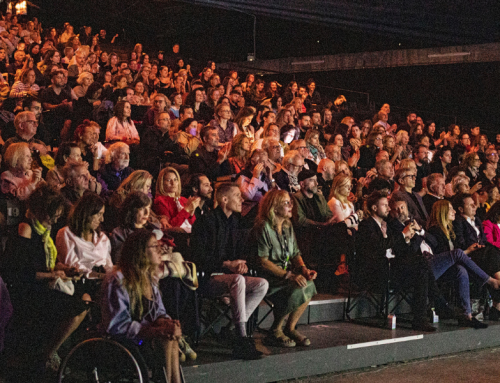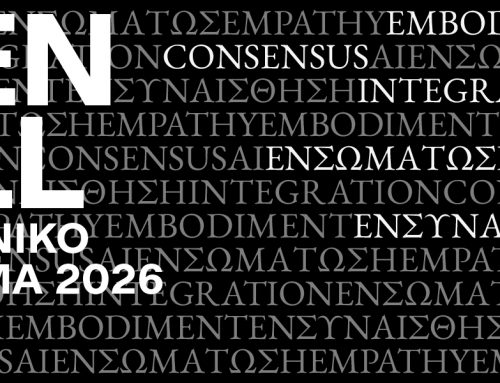Artistic Director’s Note
–
It has been two years since our reality was altered; the pandemic has affected every aspect of our lives in an unprecedented manner. In these dark times of countless losses and psychological decline, humanity has to deal with yet another shock: a war has broken loose right next to us, wreaking fear for the present and future, not only of Europe, but of the whole world. An invasion, which we utterly condemn, is taking place against Ukraine and must stop.
We live in historic times. This situation affects us profoundly, not only at a practical but also at a cultural level. These past two years, during which the entire world is constantly being tested, the work of a cultural organization like ours – aiming at global exchanges and cultural diplomacy, inviting international artists, and promoting Greek artists abroad – seemed almost beyond reach. We were shaken at our core: theatres closed down, artists were put out of work, and everything came to an unnatural stop, an anti-art mandatory halt. Inevitably, our programme was affected both in 2020 and 2021. However, we did not back down in the least. We managed to present a broad range of international and Greek productions, which were met with success, despite the strict hygiene protocols for public safety.
WHO WE ARE
The Festival is really unique in national cultural life and our mission is a complex one as we embrace all forms of Art, in our dual capacity as transmitter and receiver alike. We are a creative cluster for Greek artists and also a warm welcoming venue for international creators. At the same time, we are more dynamic and active in international co-productions and have become a considerable driving force of cooperation for international institutions, while also supporting our Greek works abroad.
We aspire to cultivate the prosperous grounds we were bestowed with by building a free space in dialogue with our era and our society, Greek, European, and global. We want to become a meeting point for dialogue and reflection, a versatile creative hub where artists are free to give birth to new ideas and highlight in multiple ways humanity’s timeless questions, yet also new, urgent questions brought forward by our times. Our programme aims at pushing Art beyond familiar territory and bringing together diverse Audiences that will form new, extraordinary communities.
We have already been working in this direction since 2020. We are devoted to live art: creators, Theatre, Dance, hybrid genres, and Music. Occasionally, we lean towards cinema and visual arts. Literature, namely language, is at the heart of our existence. Our connection with nature is unbreakable and always invigorating through the unique monuments where a great part of the artistic programme is being performed.
We cherish coexistence, synergy, and partnerships, and are not scared to suggest new, bold artistic languages by giving space to research and experimentation. Our actions aim to make the Festival a platform for discovery, emotional uplift, dialogue, and contemplation for audiences, as well as encouraging artists to expand their limits and deepen their Art.
THE YEAR PAST
The year 2021 marked the restart of cultural life after the long hard months of the pandemic. With high hopes, yet not lacking in concern, the people of Theatre, Music, and Dance began working again, creating. In these conditions, the Festival managed to stand out by presenting special sections and cycles that were embraced by Audiences and Critics alike.
One of our key priorities has been to connect the legacy of Ancient Drama with contemporary performing arts, a matter of global interest. In the Festival’s 2021 programme, this aim was realized mainly through Contemporary Ancients: a full cycle that encompasses the commission, performance, translation into English, and bilingual publication of new plays inspired by the tragic texts. Four Greek works were presented at the Little Theatre of Ancient Epidaurus, while the international co-production ödipus by Maja Zade, directed by Thomas Ostermeier, was performed at the Ancient Theatre of Epidaurus, in a world premiere. In the same context – that of the conversation between Ancient Drama and contemporary reality – Parodos, the interdisciplinary research programme on Ancient Drama, was held at the Little Theatre of Ancient Epidaurus. We also ran the Open Plan platform workshops (Morphés, Ancient Future Solo). All these initiatives continue this year as well.
Open Plan, the platform we launched during the hard winter of 2020, paved new paths. Its twelve-month operation kept our relationship with the public and artists alive and now we are able to address an even wider audience. We brought the new generation of teenagers close to us and offered art lovers fresh experiences. Moreover, in these two years, we managed to support Greek artists even in winter. The platform continues its operation through 2022, with all workshops running, whereas the new free podcast series Radio Plays is available online for all to enjoy.
In 2021 we commemorated the 200-year anniversary of the Greek Revolution by creating a very successful thematic cycle of theatre and dance performances that contemplated the legacy of 1821. Artists like Pantelis Flatsoutsis, Lenio Kaklea, and Anestis Azas presented their own subversive perspective of questions on national identity. Some of these performances have been invited to important international festivals in the coming season.
Reviewing last year’s programme, we cannot help but make special mention to the open dialogue we maintained with the world. Even during the pandemic, the Festival’s international appeal was enhanced by international co-productions and “exports” of Greek works. Prodromos Tsinikoris’ (Somewhere) Beyond the Cherry Trees was performed in Munich, Strasbourg, and Dresden while our co-productions Odyssey by Warlikowski, Roots by Kader Attou, Lamenta by Koen Augustijnen and Rosalba Torres Guerrero with Greek dancers, ödipus by Ostermeier, and Violence by Marie Brassard, which was world-premiered in Greece, were presented abroad. Hence, the Athens Epidaurus Festival also transcends national borders.
Another Festival activity that flourished was our Publications. The Contemporary Ancients cycle aimed at creating a distinct theatre book series which was brought to life in collaboration with Nefeli Publishing by translating the four new commissioned works into English. Along with the theatre book series, which made great sales, we turned the idea of a detailed catalogue in the form of an art book into reality. There will be continued emphasis on our publications this year. The Hellenic Foundation for Culture honoured us by inviting us to the Thessaloniki Book Fair, with our own booth, and also to the Frankfurt Book Fair, where our Publications were featured in the Greek kiosk for the first time in the Festival’s history.
From the first moment, we invested in the future, our future artists and audiences, by initiating thematic cycles that showcased urban culture and workshops for adolescents, putting emphasis on street dance and electronic music. One of our main aspirations was to introduce spectators to new artists. Some of them are taking part in our programme again this year so that Greek audiences can get a deeper understanding of their work over time.
The events and activities of our programme, extended from June to October, were attended live by 145,000 spectators, despite the pandemic. We are proud because our main programme, as well as every initiative we took for the dynamic restart of cultural activity, was welcomed enthusiastically.
THE 2022 PROGRAMME
We believe that the Festival should present productions in a freely planned manner without setting thematic limitations. However, while preparing this year’s Festival, a common theme gradually emerged, a common concern that seemed to permeate most performances to be staged at Peiraeus 260: Utopia and Dystopia. In different forms and artistic languages, the artists of these works, Greek and foreign alike, examine issues that may fall under the more general title “In what future do we want to live?”. In fact, further questions arise: “Who are we and what societies are we building?”, “Where will environmental destruction lead us to?”, “Is there justice?”, “Are we free?”…
This shared theme intersects with a thematic cycle inspired by the form of ANTIGONE: a feminine figure standing untouched over the centuries and inspiring us incessantly despite her “mistreatment” in school textbooks and our educational system. She always remains a pure “pièce de résistance”; a symbol of the untamed mind; an example of feminine power in a harsh, male-dominated society. This thematic cycle is titled Αntigonisms and includes two performances of the play in totally different styles – one staged at Peiraios 260 and one in Epidaurus – , a European research programme, and a series of discussions with authors and scholars from the fields of Literature and the Arts, but also Philosophy, Psychoanalysis, Social Anthropology.
There will be a lot of music at Peiraeus 260 this year with captivating acts, especially at the Platea, where we aspire to create a new attraction for audiences. To us, post-performance discussions and talks between friends and among artists are precious. We care about the spectators’ overall experience. In this view, PROLOGUE ‒ a successful initiative where young theatre experts let us in the secrets of performances before the curtain goes up ‒ will continue this year and will be followed by the newly-launched EXODOS – post-premiere invaluable discussions with the artists. In addition, a small jazz festival will be ongoing after performances at the Platea throughout July.
At the Odeon of Herodes Atticus, which features the Festival’s big names in Music, our programme of renowned Greek and international symphony orchestras, great operas and acclaimed composers will be enriched with an abundance of diverse contemporary Music acts that will include much-awaited performances. Our main goal is to bring an even more youthful audience at the Roman Odeon – an audience which perhaps has never been there again – by inviting world-class artists of electronic music as part of our Electronica cycle. At the same time, however, our Jazz Sessions and the concerts of beloved Greek performers will continue.
In Epidaurus, at the Little Theatre of Ancient Epidaurus, the very successful Contemporary Ancients thematic cycle launched last year continues with commissions for plays inspired by Ancient Drama to Greek writers. This year, we commissioned three works from award-winning Greek authors – Christos Chomenidis, Elias Maglinis, and Kallia Papadaki – who have never written theatrical plays before. Their works will be published in bilingual editions as part of the Festival’s theatre book series. The selection of the latter two, which will be staged at the Little Theatre of Ancient Epidaurus, is connected to the repertoire of the Ancient Theatre of Epidaurus where spectators will have the chance to enjoy the original plays Ajax and Alcestis in novel directorial approaches. Focusing on the deeply embedded relationship between contemporary performance and Ancient Drama, we also continue the interdisciplinary research programme Parodos, this year inspired by the form of Antigone. Furthermore, at the Little Theatre of Ancient Epidaurus we will enjoy music performances from treasured artists and also welcome a much-anticipated hybrid act bringing together performance, theatre, and dance.
The programme of the Ancient Theatre of Epidaurus is of special interest and concern to us. Our aim is to propose a wide range of Greek and international performances that are groundbreaking and refreshing, yet also classic. Wishing to expand the directorial and dramaturgical approaches to Ancient Drama, this year two co-productions will be world-premiered, staged by international avant-garde directors ‒ Johan Simons with Schauspielhaus Bochum and Ulrich Rasche with Munich’s Residenztheater ‒, as well as a co-production with Eleusis 2023 – European Capital of Culture. The programme of the Ancient Theatre of Epidaurus also includes, like every year, three performances by our State Theatres, and also private productions with distinctive directorial approaches and brilliant casts. We believe that we should all work together to remind audiences of how unequalled it is to watch a performance in Epidaurus. Thus, our two international co-productions will be exclusively performed at the Ancient Theatre of Epidaurus and our Greek co-production will only hold four more performances over a two-month period. For us, it is crucial to reflect anew on the philosophy and the future of the Epidaurus programme by initiating a dialogue that will be constructive for everybody. To this end, a special Symposium with prominent guests will be held at Peiraeus 260.
OUR NEW VISUAL IDENTITY
To renew our visual identity, we revisited an old tradition of our organization. Many of you may remember older Festival posters by artists like Moralis, Takis, Fassianos, Mytaras, Katzourakis. Hence, this year the production of our visual identity was assigned to a major visual artist alongside an exceptional design consultancy: Jannis Varelas – with his distinctive personal imprint and affection for the sense of surprise brought about by intermingling diverse techniques and unifying the abstract and the realistic, an artist sensitive to colour and irony alike – and G Design, noted several top-notch collaborations with cultural institutions and international awards for their wide scope of activity. This collaboration gave us great joy.
In closing, I would like to thank the Athens Epidaurus Festival team and all collaborators who, despite adverse conditions, worked with devotion and diligence to prepare and realize the Festival in the best possible way. Also, I would like to thank our Board of Directors, President Mr. Dimitris Passas, Vice-President Mr. Alexis Galinos, and all members of the Board, for their unwavering support during these two very difficult years, which has been crucial for all our endeavours, as well as the Festival’s Director General Mr. Ioannis Kaplanis for our daily creative collaboration.
I warmly thank the Minister, Ms. Lina Mendoni, for her full support and personal care for the numerous issues and challenges the Festival has dealt with. Also, I would like to thank the Deputy Minister of Culture and Sports, Mr. Nicholas Yatromanolakis, for his keen interest on our work and his practical assistance. I would also like to thank the Secretary General of Contemporary Culture, Dr. Eleni Doundoulaki, and the Secretary General of Culture, Mr. Giorgos Didaskalou, for their deep interest in helping the Festival.
I would like to especially thank the team of artistic advisors – their contribution to the programme is invaluable. And, of course, I cannot but express my gratitude to the artists! Thanks to them we have a creative, diverse, open, rich, and inclusive Festival. Above all, I thank you, the audience, who honoured the Festival and filled our theatres, even under the harsh conditions of the pandemic. We will be waiting for you this year as well with even greater enthusiasm!
Katerina Evangelatos



